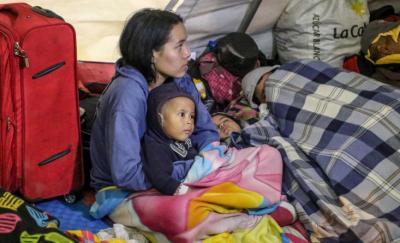Irregular Migration to the U.S. from Central America: Understanding the Drivers and Outlining the Responses


The hundreds of thousands of Central Americans who flee their homes each year and migrate to the U.S. have lots of reasons for doing so, from political repression to fear of criminal cartels to the simple pursuit of a better life. In July 2021, the Biden administration issued the U.S. Strategy for Addressing the Root Causes of Migration in Central America, which emphasized Washington’s commitment to supporting the development of Central America. If countries could provide an economic future and safer life for their citizens, the incentive to leave would diminish.
In this panel sponsored by Somos Abt—an Abt Employee Networking Group—we will dive into both the push and pull factors behind irregular migration—that is, unauthorized but not necessarily illegal border crossings--from Central America to the U.S. We will discuss what the U.S. is doing to address these influences and what is yet to be done to build hope in the region.
MODERATOR:
- Sara Jones, Technical Lead for Governance, Economic Growth, and Migration, Abt Global
PANELISTS:
- Manuel Orozco, Director of the Migration, Remittances and Development Program, Inter-American Dialogue
- Russell Porter, Staff Director, Northern Triangle Task Force and Deputy Director, Office of Central America and Mexico, USAID
- Aura Marina Luiz, Lived Experience Expert from Guatemala
Simultaneous translation between English and Spanish will be provided through WebEx subtitles.
Watch the webinar:
Additional Resources

Migrant Seasonal Head Start Study
Migrant and Seasonal Head Start (MSHS) provides early childhood education, social and support services to culturally and linguistically diverse migrant and seasonal farmworker families and their children. Since the last nationally representative study of…

Local Health System Sustainability Project (LHSS)
Low- and middle-income countries are committed to universal health coverage (UHC) and better primary health care but they sometimes need targeted support to get there. Governments and health providers have to become more accountable. Health financing…

Humanitarian Assistance or System Strengthening? Both Are Needed for Migrant Health
The USAID-funded, Abt-led Local Health System Sustainability project helps develop system strengthening strategies for aid migrants in LAC countries.

120M Women and Girls Are Migrants. Meeting Their Health Needs Would Shape More Inclusive Health Systems.
Migrants are the largest marginalized population on earth and growing every day. Health systems’ ability to meet their health needs can be a useful proxy for overall resilience and inclusivity.
- Environment & Energy
- Energy, Infrastructure & Transportation
- Clean Air, Water & Land
- Disaster Risk & Emergency Management
- Agriculture Market Systems & Food Security
- U.S. Food Security & Agriculture
- Economic Growth & Governance
- Governance
- Sub-National Governance & Decentralization
- Health
- Health Policy & Workforce
- Infectious & Vector-Borne Diseases
- Workforce Development
- Inclusive Economic Growth
- Stabilization & Transition
Region
- Latin America and the Caribbean